By Laura Fuller & Devon Marnoch
The Perception of Scarcity
Empty shelves, closures of favourite restaurants and having to plan ahead for meals bring newfound challenges as we may no longer have immediate access to the food we want or need. For those who are already food insecure, COVID-19 may have exacerbated these circumstances. Food insecurity is a concept in research that has been linked to overconsumption of foods as well as Binge Eating Disorder. Binge eating is believed to stem from both self-imposed restriction and stress relating to food availability out of our control. Essentially, in these mindsets, it is in our nature to overeat out of the fear of not knowing when the next opportunity to eat will be. During such times, our bodies are also driven towards more energy dense foods to increase our fat stores which causes us to crave foods high in sugar and fat. Our body does this to prepare for potential future deprivation - an adaptive feature that served us well in the hunter-gatherer era. More recently it has been suggested that this psycho-physiological drive to overeat can be triggered by the thought of scarcity alone, whether food access is physically limited or not. If you find yourself overeating in quarantine, please know this is a natural response and is likely to be your body’s way of protecting itself.
Effects of Stockpiling
Despite feeling more food insecure than ever before, our pantries are perhaps fuller than we are used to. Having a large amount of food within reach can be a highly stressful situation for those experiencing difficulties around eating. If you are struggling with this, it may be helpful to keep the food somewhere less accessible and/or create a list of distraction techniques to use during this time. Alternatively, the effects of stockpiling may cause ‘safe foods’ to be less readily available. It could be useful to speak to people in your support network to see whether they can assist you in finding these items or help you think about substitutes.
Excessive Food Talk & Social Media
Scrolling through Instagram right now, we are faced with never ending recipes and nutritional advice. Consuming this constant information can be overwhelming. Not only do food-related images activate biological hunger responses, but the psychological burden of excessive food talk may be overwhelming. Although it is important to stay connected with friends and family, it could be beneficial to limit access to certain food-centered accounts during this time.
Emotional Eating
Social isolation is a major feature of eating disorders, acting as a coping mechanism whilst feeding the illness with avoidance and secrecy. Social distancing therefore may be triggering or feel like a backwards step for many. Whilst isolation may cause temptation to restrict intake, feelings of loneliness can also lead to overconsumption. In response to this feeling, the brain seeks foods high in sugar and fat e.g. chocolates, sweets and cakes. The gratification associated with the consumption of these foods leads to dopamine production - which activates the pleasure centers in the brain, making us feel happier. Many of us may feel some sort of guilt after consuming these foods, however these feelings will fade. For those struggling with eating behaviours, this can be especially challenging.
Take-home message
All of these changes to our usual routine can be especially challenging for those with difficulties around food and eating. If you do find yourself struggling during this time, reach out to others and try to find reassurance in the fact that these changes are only temporary. A follow up post will explore different ways to cope with the impact these changes may have on food behaviours during lockdown.
Resources:
BEAT. 2020. Eating disorders and Coronavirus [Online]. Beat: Beat. Available: https://www.beateatingdisorders.org.uk/coronavirus [Accessed 26/04/2020].
- Giel, K., M., Friederich, H. C., Hautzinger, M., Enck, P. & Zipfel, S. 2010.Processing of Pictorial Food Stimuli in Patients with Eating Disorders – A Systematic Review. The International journal of eating disorders, 44, 105-17.
- Kroemer, N.B., Krebs, L., Kobiella, A., Grimm, O., Vollstadt-klein, S., Wolfensteller, U., Kling, R., Bidlingmaier, M., Zimmermann, U. S. & Smolka, M. N. 2013. (Still) longing for food: Insulin reactivity modulates response to food pictures. Human Brain Mapping, 34, 2367-2380.
- Mental Health Foundation. 2020. Living with the pandemic if you already have mental health problems [Online]. Mental Health Foundation. Available: https://www.mentalhealth.org.uk/coronavirus/pre-existing-mental-health-problems [Accessed 26/04/2020].
- Phillips, C. 2019. The importance of routine [Online]. Mind Charity: Mind. Available: https://www.mind.org.uk/information-support/your-stories/the-importance-of-routine/ [Accessed 26/04/2020].
- Pritchard, M. & Yalch, K. 2009. Relationships among loneliness, interpersonal dependency, and disordered eating in young adults. Personality and Individual Differences, 46, 341-346.
- Seliman, H. K. & Schillinger, D. 2010. Hunger and Socioeconomic Disparities in Chronic Disease. New England Journal of Medicine, 363, 6-9.
- Singh, M. 2014. Mood, food, and obesity. Front Psychol, 5, 925.
- Stinson, E. J. Votrube, S. B. Venti, C., Perez, M., Krakoff, J. & Gluck, M. E. 2018. Food Insecurity is Associated with Maladaptive Eating Behaviours and Objectively Measured Overeating. Obesity (Silver Spring_, 26, 1841-1848).
- Tribole, E. R., E. 2012. Intuitive eating. New York, USA, St Martin’s Griffin.
Photo legend: Images provided by artists at Unsplash.com


